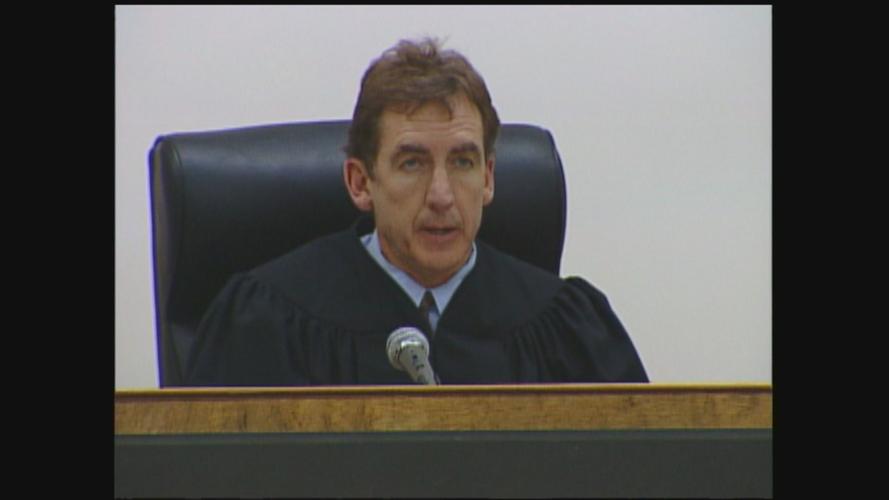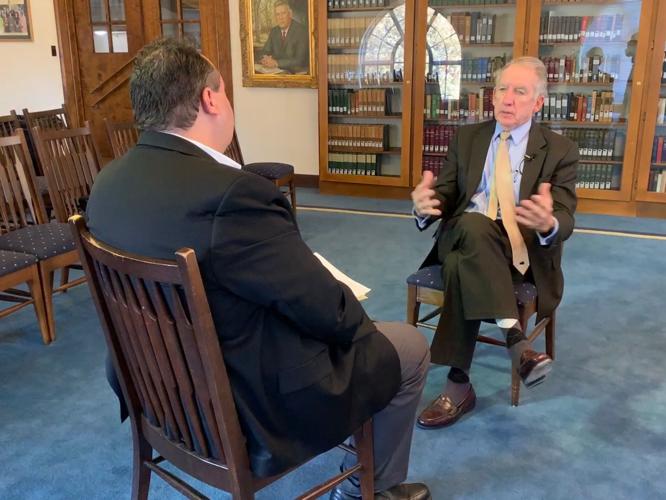
WPSD Local 6 anchor Todd Faulkner interviews Kentucky Supreme Court Justice Bill Cunningham (retired) inside Pogue Library on the campus of Murray State University.
Can you name the three branches of the United States government? Only 39% of Americans can, according to an Annenberg Survey conducted earlier this year.
The Legislative Branch creates the laws and consists of Congress, which is made up of the Senate and the House of Representatives. The Executive Branch carries out the laws and includes the president, vice president and the cabinet. Finally, the Judicial Branch interprets the laws and includes the Supreme Court and other federal courts.
The framers of our Constitution designed a separation of powers to provide checks and balances on each branch. However, retired Kentucky Supreme Court Justice Bill Cunningham believes there's a looming threat to our government, our democracy and our American Truth.

This photo shows Commonwealth Attorney Bill Cunningham in 1981.
Cunningham said the United States Constitution is unique, and Americans should appreciate its design.
"It's the genius that it portrays. That Constitution, 230 years old. It was written 230 years ago. When that Constitution was written,l doctors were still bleeding people for illnesses with leaches. It took months to get across the Atlantic Ocean," Cunningham said.
He added, "And it was this development of the separation of powers, Judicial, Executive, Legislative Branch where they had a checks on each other. And without that this, democracy wouldn't last. We'd have a tyrant. We'd have a tyranny. We would have an oligarchy."

This photo shows Circuit Court Judge Bill Cunningham in the late 1990s.
Cunningham's appreciation and passion for the judiciary has been on display for decades in western Kentucky: first as an attorney, later as a commonwealth's attorney, a circuit court judge for 15 years, and then his meteoric rise to the Kentucky Supreme Court. Cunningham represented the Supreme Court's First District from 2006 to February 2019 before stepping down.
He now teaches a legal course at Murray State University, inspiring future generations and imparting his decades of judiciary experience on to college students.
"You know, there's a saying in these parts, 'When somebody dies, the library burns.' Well, someone doesn't have to die for that experience to go to waste. So, I felt like I wanted to share it with people. I wanted to share it with young people," Cunningham said.

Justice Bill Cunningham asks a question during oral arguments of the Kentucky Supreme Court.
And although his class consists of people who are very much his junior, Cunningham feels there are reasons why he connects with them.
"I think that we've bridged it, because there's one thing that we have mutual respect for and that is hard work and intellectual curiosity," Cunningham said.
I sat down with Cunningham to talk about whether he believes the checks and balances system is working as efficiently as the founders hoped.
"I think it's working right now, but I think it's dangerously threatened. I think it's being eroded every day. We're blending those lines between the judiciary and the legislature," Cunningham said.

Bill Cunningham teaches a legal course at Murray State University in fall of 2019.
Specifically, the power Article II of the Constitution gives the Executive Branch. "He shall have Power, by and with the Advice and Consent of the Senate ... shall appoint ... Judges of the supreme Court."
The Senate's 1987 rejection of President Reagan's Supreme Court nominee, Robert Bork, sparked the escalating threat to the judiciary.
"So, they took him to task and it became a grilling. And when that happened? When the republicans saw what the democrats did with this, and politicized it, and actually defeated the nomination, they said, 'Well, two can play at that game.'"
And democrats did in 2016 when President Barack Obama nominated Judge Merrick Garland for associate justice of the U.S. Supreme Court to succeed Antonin Scalia, who had died one month earlier.
Senate Majority Leader Mitch McConnell refused to even hold hearings for the nominee, citing the presidential election that year.

Bill Cunningham teaches students in his criminal justice class at Murray State University.
Obama at the time responded: "If you don't, then it will not only be an abdication of the Senate's constitutional duty. It will indicate a process for nominating and confirming judges that is beyond repair."
Democrats swung back in 2018 when President Donald Trump nominated Judge Brett Kavanaugh as an associate justice to succeed Anthony Kennedy.
Kavanaugh faced sexual assault accusations from decades earlier in hearings that quickly became contentious — often fueled by democrats.
Kavanaugh testified at a hearing: "This is a circus! The Constitution gives the Senate an important role in the confirmation process, but you have replaced 'Advice and Consent' with search and destroy!"
The Senate ultimately approved Kavanaugh, who now sits on the Supreme Court, but Cunningham says the entire process is in danger.
"Both sides pour millions of dollars in defeating a candidate for Supreme Court that's nominated by a president that's not of their party. That's not right. That's wrong. So, in recent years, we've got senators that brag about shaping the federal court system. Well, when you hold up the federal court system — the members of the judiciary — as being your legacy, 'This is what I did,' you got a United States Senate controlling the Judiciary," Cunningham said.
Cunningham said what's happening in our nation's capital should alarm every single American.
"I see dark clouds billowing, dark clouds roaring in on our separation of powers because of the legislature's attempt to take over the judiciary, quite frankly. And if that happens, we're not going to have three branches of government. You're going to have the Supreme Court of the United States as a branch of Congress," Cunningham said — a serious threat to our democracy and the farthest thing from any American Truth.
























